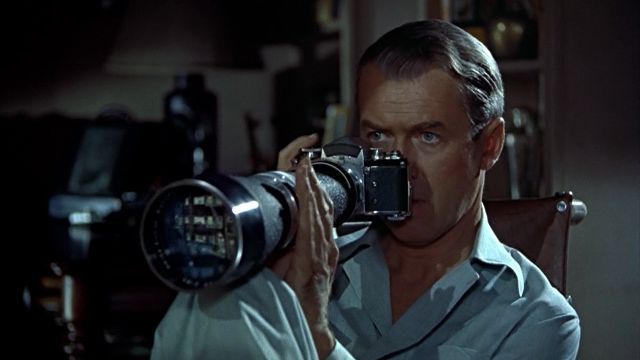Rear Window (1954) 
“It only takes one witness to spoil the perfect crime.”

Director: Alfred Hitchcock
Cast: James Stewart, Grace Kelly, Wendell Corey
Synopsis: A wheelchair bound photographer spies on his neighbours from his apartment window and becomes convinced one of them has committed murder.
Elements of voyeurism had played a part in Alfred Hitchcock’s movies right from the early stages of his career. As far back as The Ring (1927) he had a character peering through a hole in a tent to gaze upon the forbidden arena of a boxing match, and in The Lady Vanishes (1938), a hotel waiter covertly eyes the shapely legs of a female guest before opening a bottle of champagne. These were simply moments within a movie, but in Rear Window he devoted the entire film to the subject by confining the action to one large set and having us watch the characters from the point of view of L.B. Jeffries (James Stewart), a photographer turned voyeur by virtue of the fact that he is housebound by a broken leg.
Jeffries’ days consist largely of gazing out upon his neighbours, who live in apartment blocks that share a communal central courtyard so that, from his vantage point at the window of his own apartment, Jeff can see pretty much everyone whose abode looks out from the three walls opposite and adjacent to his own. The window into each apartment resembles a movie screen on which various modest dramas unfold. The players on these screens are a mixed bunch, providing a microcosm of society’s typical characters: there’s a nubile blonde who spends most of her time exercising in her underwear or entertaining groups of male admirers, a lonely single woman desperate for a man to complete her life, a musician whose music echoes across the courtyard as he perfects his songs, a married couple who sleep on their fire escape during the heat wave in which the story takes place and who use a winch to lower their dog to the gardens below, a middle-aged woman who likes to sunbathe, and a newlywed couple who remain hidden behind a closed blind for most of the time. Each of these characters receive equal attention from Jeff, but it’s one bickering couple in particular who slowly become a focal point.
The wife (Irene Winston) is bedridden, and apparently difficult to please – although we only occasionally hear anything any of the characters say, as Jeff would – and the husband, Lars Thorwald (Raymond Burr), is a hulking, brooding man. He seems to lead a pretty thankless life, which might account for his prematurely white hair. One sleepless night, Jeff sees Thorwald leaving his apartment on a number of occasions carrying a large case, and the following morning Mrs Thorwald is nowhere to be seen. Jeff slowly becomes convinced that she has been murdered by her husband, and enlists the help of his society-type fiance Lisa (Grace Kelly) and working class nurse (Martha Raye) to investigate when his police detective buddy (Wendell Corey) is by turns unable and reluctant to help.
Although the prominent theme of Rear Window is voyeurism, equally important is the importance of relationships, the stages of which are all represented. Jeff is a photographer – he observes life in all its forms even when active – and he feels that the prospect of marriage to Lisa, a socialite whom he believes will be unable to adapt to a life spent largely in foreign and inhospitable lands, will threaten his mobile lifestyle. The Miss Lonelyhearts character yearns for love; the newlyweds are in the earliest stage of marital life, the fire escape couple in a state of complacent contentment. Thorwald and his wife, of course, are at relationship’s end.
As you’d expect from Hitchcock, the movie is technically accomplished, not only in the way it fashions a tense, absorbing thriller using only one set and having large chunks of the action played out in silence, the only noises those of the residents rather than a mood-setting score. By seeing most of the action from Jeff’s point of view – his temporary handicap not only gives him a reason to be spying on his neighbours but also makes himself as helpless as the audience to affect the things happening on all those little movie screens – Hitchcock forces us to empathise with a character whose activities – spying on his neighbours – many would find distasteful. The story perhaps doesn’t hold up to scrutiny – after all, how difficult would it be for the police to check that Mrs. Thorwald actually had arrived at the address where her husband claimed she was? – but there’s so many other things to enjoy about Rear Window that to complain about such things would be churlish.
(Reviewed 15th August 2012)
Click below for a free preview of the Kindle book, The Films of Grace Kelly. The book, written by the author of this review, features reviews of all of the actor’s films, and is available to buy, or to read for free if you’re a member of Kindle Unlimited.
httpv://www.youtube.com/watch?v=6kCcZCMYw38
